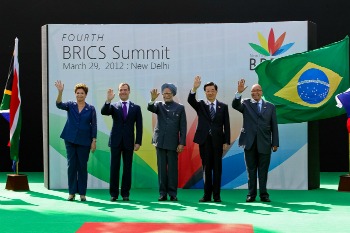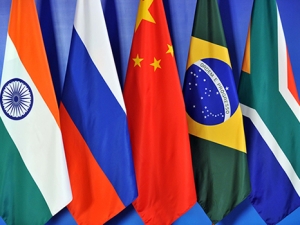South Africa’s Lack of Public Diplomacy Negates BRICS Membership Benefits on the Continent
South African President Jacob Zuma spent much of his first term shuttling between the capitals of the original BRIC countries to secure the Republic’s entrance into the club of emerging markets. He did this to open up South Africa to investment from these economic powers that seemed to be the emerging leaders after the 2008 financial crisis. South Africa had weathered the storm exceptionally well and had pitched its membership as a way for the other BRIC nations to gain entry to the African continent. The continent’s blistering growth has been quickly acknowledged by non-Western countries and they are quickly capitalizing on the growing consumer base and increased political stability to extract natural resources.
President Zuma with the other BRICS leaders at the first BRICS summit where South Africa was a full member (2011 summit in Sanya, China)
© Flickr, 2011.
Substantial time and energy were expended on this project, and Zuma was rightfully praised for his ability to raise the country’s profile at the time. Even Jim O’Neill, the coiner of the BRIC term who had initially been critical of South Africa’s membership, has since modified his views on the potential of Africa’s representative joining the exclusive bloc. Other than the obvious investment opportunities that were believed to be Zuma’s motivation, three further objectives were articulated by South Africa’s PD chief, Clayson Monyela. The membership advances South Africa’s national interests, promotes regional integration and related infrastructure programs, and creates partnerships with key Southern players on issues of global governance reforms. The odd part of this is that South Africa has hardly conducted any public diplomacy campaigns in its fellow BRICS countries, nor in other African nations. While there are aid and investment projects and conferences, South Africa’s PD seems to lack significant reference to BRICS membership, which may explain why many media outlets still reference the club as BRIC(s). Instead, South Africa’s brand, which already had the attention of government and business, seemed to be the primary PD beneficiary, which in turn spelled increased tourism potential for the nation.
South Africa has taken some notable foreign policy missteps during Zuma’s term, including the vote against the UN resolution for action in Libya, the inability to stem the conflict through negotiation in Cote d’Ivoire, and the failure of the South African-backed Global Political Agreement in Zimbabwe. As a result South Africa’s foreign policy momentum finally hit a wall earlier this year by failing to gain the position of Chairperson of the African Union Commission, essentially the top job at the organization. South Africa’s candidate, Zuma’s ex-wife and former Minister of Foreign Affairs Nkosazana Dlamini-Zuma and the current holder, Jean Ping from Gabon, reached a deadlocked vote at the recent AU meeting this spring. Reports have suggested that the votes broke down along linguistic lines, with Ping receiving the backing of Francophone Africa, and Dlamini-Zuma receiving the English-speaking votes (sans notable powers Nigeria and Kenya). If she had been elected, Dlamini-Zuma would have been the first permanent Chairperson or Secretary-General of the AU or OAU to come from an English-speaking African country. The vote was seen as a repudiation by those who felt that South Africa’s role was reaching hegemonic proportions perhaps due to membership in the BRICS bloc. South Africa engaged in a full-court press to gain support, conducting traditional, back-room diplomacy to secure what votes it received at the AU, rather than leveraging the public rhetoric of being a gateway to Africa for the rest of the BRICS countries.
Despite Zuma promising to abide by the AU’s decision at its next meeting in Malawi, the positive momentum built up by Zuma’s early diplomatic success was never translated into a public diplomacy effort towards the continent. The Republic may face the outcome of that failure if Dlamini-Zuma is defeated in July.
Tags
Issue Contents
Most Read CPD Blogs
-
January 29
-
January 20
-
January 28
-
January 2
-
January 8
Visit CPD's Online Library
Explore CPD's vast online database featuring the latest books, articles, speeches and information on international organizations dedicated to public diplomacy.










Add comment